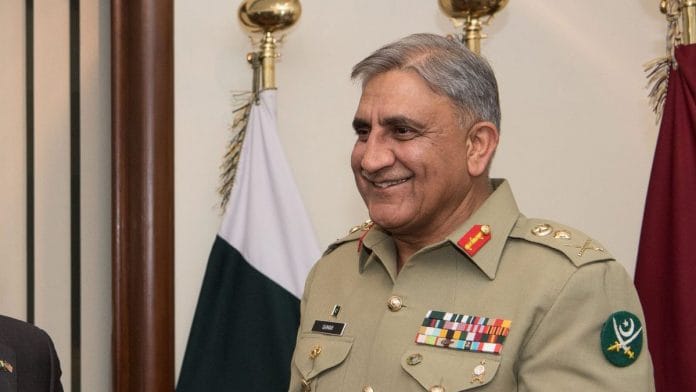As Pakistan Chief of Army Staff General Qamar Javed Bajwa, who became the country’s most powerful man on 29 November 2016, gets ready to retire, the billions he and his family reportedly acquired in six years have become the topic of dinner-table conversations in the country. In an attempt to quell questions of corruption and allegations of political powerplay, the Shehbaz Sharif government has even launched a probe against the journalist who leaked the tax records of Bajwa’s family members. But the rumour mills are already churning.
That said, political analysts and commentators aren’t questioning the General’s cache of wealth but the timing of the leak. It should be read within the context of this battle for power and wealth, according to Ayesha Siddiqa, Pakistani political scientist and a senior fellow at the Department of War Studies at King’s College, London.
“Being the Army Chief in Pakistan is like being the king–all powerful and access to all these benefits. And the King is not answerable to anyone except his cabal,” Siddiqa says.
And she’s not the only one who is questioning why the report has been made public now.
“The timing of the leak could be because of a difference between the political leadership and the Army Chief or owing to differences amongst senior officials for Bajwa’s choice from the nominee list,” said a retired Indian bureaucrat and Pakistan analyst.
It could be read as a targeted attack on Bajwa, who, as Uzair M. Younus reports in Dawn, “leaves behind a legacy at odds with itself, and adrift globally”. Bajwa, he notes, moved “quickly to solidify his control over Pakistan’s political economy” but he would also “oversee the collapse of the model of hybrid democracy that has governed Pakistan since 2008”. As a result, the military would “experience a dramatic decline in its standing” across the country, he writes.
Crown holder, crore commander
The General’s wealth has to be examined within the context of the role that Pakistan’s military plays. It runs a huge commercial empire, an internal economy estimated to be billions of dollars.
Siddiqa, in her book Military Inc: Inside Pakistan’s Military Economy, identifies two of the military’s biggest business conglomerates in the country: The Fauji Foundation and the Army Welfare Trust. This kind of ‘military capital’ does not follow the protocols and norms of accountability that government institutions have to follow or even a military project or programme financed by the public sector, say experts.
“The inability to apply government accountability procedures to Milbus (army capital) itself increases the possibility and magnitude of corruption,” Siddiqa writes in her book.
Hence, in this context, General Bajwa’s position, or rather wealth, isn’t unique.
Over the course of six years, his family members have reportedly started international businesses, purchased multiple foreign properties, transferred capital abroad, and became owners of commercial plazas, plots and huge farmhouses in Islamabad and Karachi. They also acquired a real estate portfolio in Lahore.
Also read: Why Imran Khan’s win won’t assure Pakistan of zero military interference
The leaked tax records
Pakistani website FactFocus dug out the details of the financial dealings of various members of Bajwa’s family, including his wife Ayesha Amjad and his daughter-in-law Mahnoor Sabir. The website describes itself as a ‘digital media news organisation working on data-based investigative news stories’.
The report, which examined the family’s tax records, claimed that family members had assets amounting to PKR 12.7 billion acquired during Bajwa’s term. It claimed that the assets of Ayesha Amjad went from zero in 2016 to PKR 2.2 billion (declared and known) in six years.
Finance Minister Ishaq Dar ordered a probe into the ‘illegal, unwarranted’ leak of the COAS’ family tax records. Dar has directed the Special Assistant to the Prime Minister on Revenue, Tariq Mehmood Pasha to personally lead the probe, affix responsibility, and submit a report within 24 hours.
Following the announcement of the probe into the leak, the author of the Fact Focus report, journalist Ahmed Noorani, posted on his Twitter account that the government had confirmed the accuracy of his article.
But multiple Pakistani users reported that they were unable to access the report. The website faced heavy traffic for 18 hours, and connectivity was restored on Monday night.
Not a fresh tale
Under Pakistani law, the incumbent prime minister is empowered to choose a COAS. The PM receives a list of four to five senior-most lieutenant generals from the General Headquarters via the Ministry of Defence.
“With this kind of ‘monetisation of sacrifice’ and increase in indirect subsidies to the military, a corrupt ecosystem only continues to grow and fester,” says Siddiqa. And hence, this issue must be read against the larger backdrop of corruption wielded by the military and the ongoing ecosystem it is building.
This news of military officials amassing this kind of wealth and acquiring capital is not new to Pakistan. In August 2020, journalist Ahmad Noorani investigated the alleged offshore properties and businesses of Lieutenant General Asim Saleem Bajwa (Retd), former head of the China-Pakistan Economic Corridor Authority.
Usman Manzoor, also an investigative journalist from Fact Focus, had previously published a report showing the tax records of former PM Imran Khan and alleged that he and his wife hadn’t declared the value of the foreign gifts they had retained at ‘throwaway prices’.
“The growth of the Bajwa family’s business empire in the United States, and later in Pakistan, directly matches the rise in power of General Asim Saleem Bajwa, who is now chairman of the country’s massive China-financed infrastructure project and a special assistant to the Prime Minister,” the report published on Fact Focus stated.
(Edited by Humra Laeeq)






